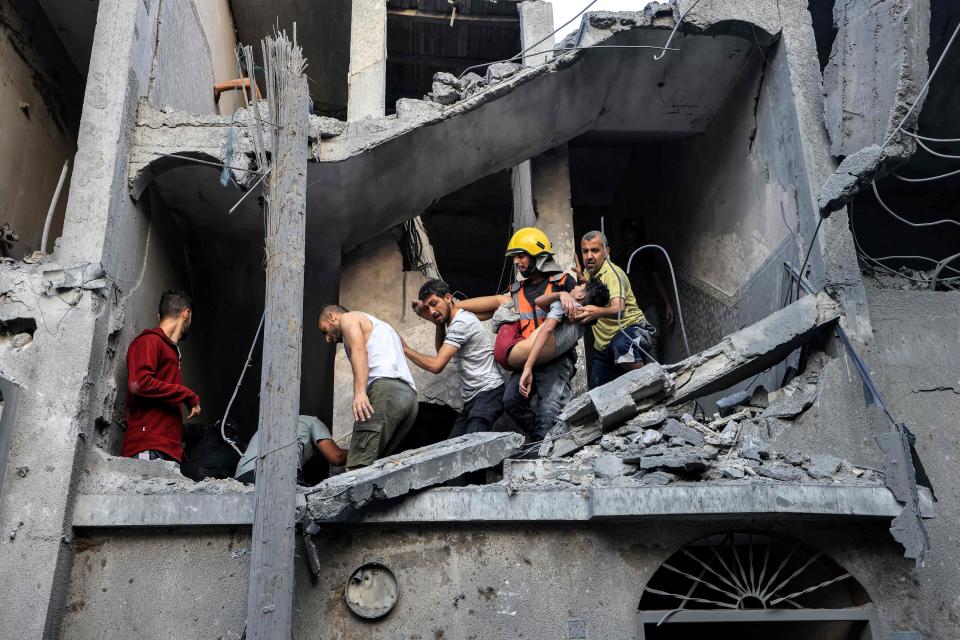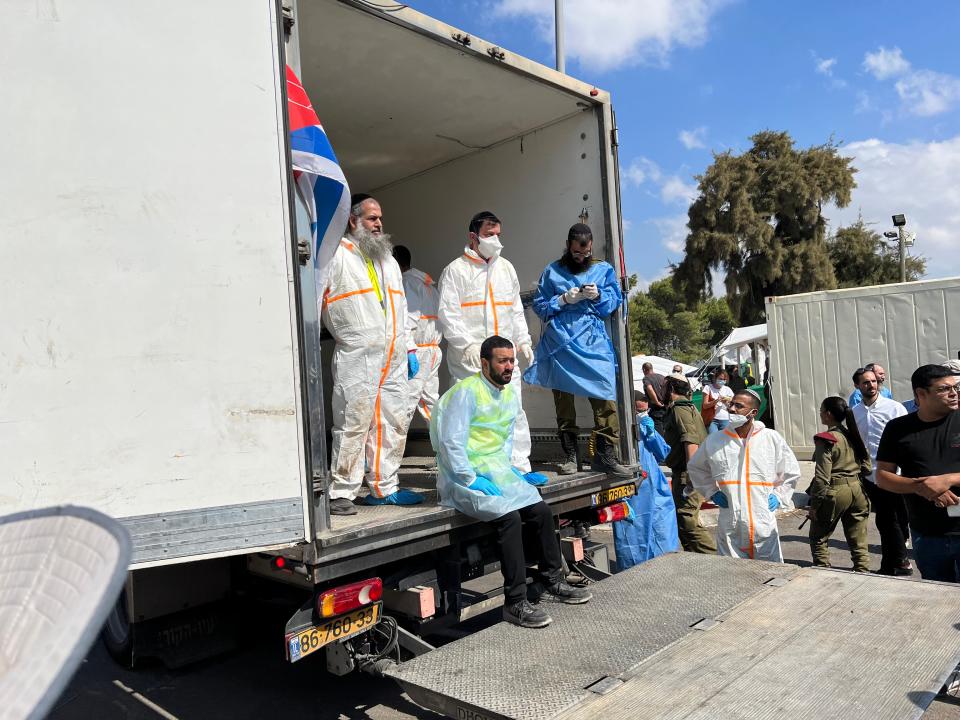'We have no funeral cars, no ambulances.' In Israel-Hamas war, a struggle to bury the dead
Warning: This article contains graphic descriptions of death.
JERUSALEM − They don't agree on a lot of things. They agree on this: What they have seen and had to do, no one should have to see or do.
Two weeks into the conflict that began when Hamas massacred civilians in rural communities and at a music festival on Israel's border with the Gaza Strip, Israelis and Palestinians have been collecting, weeping over and burying their dead with as much dignity as they can in trying, unpredictable and dangerous circumstances.
In Israel, where more than 1,400 civilians and soldiers have died and where all Jews are by religious tenet supposed to be buried immediately after death − a few days at most − this has involved emergency responders going to great lengths to recover bodies they have discovered in scenes of unspeakable horror, sometimes in places where fighting is still taking place.
In Gaza, where at least 3,500 Palestinians have been killed and large parts of the territory controlled by Hamas are in ruins as a result of Israel's bombing campaign, this has meant families resorting to makeshift graveyards dug in empty lots and authorities storing bodies in ice cream freezers as morgues fill up, doctors and witnesses say.
'I won't condemn Hamas': Some Palestinians find it hard to denounce attacks on Israel
"I'm not eating. I'm not sleeping," said Israeli search and rescue volunteer Yossi Landau, 55, as he struggled not to weep Wednesday recounting some of what he witnessed in villages in southern Israel after the nation's deadliest attack ever.
Meanwhile, in Gaza, photographer Ali Jadallah said that "we have reached a catastrophic situation" in which Israel's bombs are killing scores of Palestinian families − sometimes entombing them in their collapsed homes, sometimes leaving their mutilated bodies scattered among the ruins.
On both sides of the Israel-Gaza border, faith traditions define the rules of burial. For Jews, who believe the dead must be watched until they are buried and that every part of a body must be buried, the idea of unguarded remains is an almost unthinkable lapse. Within the Muslim tradition, the body is wrapped in a shroud and the head is positioned to face Mecca with the eyes and mouth closed.
Jadallah said he has lost nine family members to Israeli airstrikes, according to updates he has been posting on his Instagram account. He filmed himself this week as he was driving in his car. Across the back seat lay the body of his father, killed in one of those Israeli strikes.

Biden embraces Netanyahu: U.S. president says Israel must again be 'safe place' for Jewish people
"We have no funeral cars, no ambulances," he said.
"I'm taking him alone (to bury him). I know people can't attend the funeral. No one can. But please pray for him. He was a decent and beloved man."
'I broke. I blanked out'
In Israel, Landau works for ZAKA, a volunteer organization whose members are almost all ultra-Orthodox Jews. Its mission is to collect the remains of the dead, including their blood if they can, so they can be buried in accordance with Jewish religious law.
For the past three decades, Landau has deployed for ZAKA all over the world. He was in New York after the 9/11 attacks. He has responded to natural disasters in India. He has rushed many times to the scene of suicide bombings.
He helped recover the dead in Surfside, Florida, when a 12-story condominium building collapsed early in the morning of June 24, 2021, killing 98 people.
Israel-Hamas war: She spent her life advocating for Palestinian rights. Then Hamas came
Yet Landau said that what he encountered in several of the kibbutzim that dot the front lines where Israeli civilians and soldiers were killed by Hamas on Oct. 7 was more than he could bear.
"I broke. I blanked out," he said.
Landau said that in one home, in Kibbutz Be'eri, he saw children as young as 6 with their hands tied behind their backs in the same room where their parents were also executed. They were missing fingers and eyes. In another home, he found a pregnant woman lying face down in a pool of blood. When Landau and other ZAKA volunteers turned the woman over, they found her belly had been "butchered open" and the unborn child connected to her had been stabbed.
"I don't know if you know − and you should never know − what it means to separate parts of a burned body," he said, referring to the charred remains of people he came across in vehicles and safe rooms in Be'eri and other kibbutzim in the days after Hamas' assault.
Filled body bags − some of them very small
The killing scenes Landau described were corroborated by half a dozen other ZAKA volunteers who were present in Be'eri and elsewhere with him as part of their emergency response.
Cellphone videos, security footage, photographs from residents and accounts of witnesses who survived the initial attacks have also helped establish with some specificity the brutality of the Hamas attacks on civilians on Israel's southern border.
ZAKA volunteers are generally prohibited, as a matter of religious custom, from photographing the work they do. But Israel's military has asked them to document it as part of the process of collecting evidence and in case it is helpful in identifying remains.

A ZAKA volunteer named Nachman Dickstein, who was with Landau in Be'eri, showed USA TODAY photographs that further corroborated his grisly accounts of murdered Israelis. And last week, USA TODAY visited an Israel Defense Forces base on the outskirts of Jerusalem where a rabbinate unit of Israel's military has been working to identify the remains of people, including women, children and infants, after ZAKA volunteers delivered them there from communities in Israel's south.
Hamas attacks: How Israeli police are trying to find the gunmen
On the grounds of the base were a series of refrigerated trucks and shipping containers. Inside were dozens of filled body bags of various sizes − some of them very small.
The bodies are piling up in Gaza
Palestinian Muslims and Christians, like Jews, believe that the dead should be buried as quickly as possible, ideally within 24 hours.
The bereaved family typically hosts a meal and opens their home for three days for guests to visit and share their condolences. Unsweetened bitter coffee is served.
Friends and family recount the life and qualities of the loved one.
In Gaza, there is now little capacity to observe these rituals.
After Jadallah drove his father's body to a private burial site, he went straight back to work, he said in a brief interview Thursday. One of the first photos he took was of a paramedic performing CPR on a wounded man. Jadallah's Instagram feed is filled with increasingly apocalyptic images of bombed-out and smoldering homes, mosques, schools and even hospitals.
At least 16 Palestinian journalists have been killed since Oct. 7, according to the Palestinian Journalists Syndicate, a nongovernmental professional organization.
"Who kills babies, who kills babies − free world, where are you?" a doctor at the European Gaza Hospital in the southern city of Khan Younis pleaded Thursday in a video circulated by health officials and journalists in Gaza.
He stood in front of a stretcher on which lay six precious bundles. Bloodied, bandaged and lifeless, their tiny bodies were covered in a fine gray dust from the exploded concrete and brick that killed them.
Still, while the bodies in Gaza are piling up, it's too dangerous to hold funerals, and the Palestinian enclave on the Mediterranean Sea is now running out of body bags, according to the United Nations.
Riham Al Qeeq, 40, a mother of four, said her cousin was buried in a mass grave after an explosion Tuesday at the crowded Al-Ahli Hospital in Gaza City.
She said she wasn't able to join in a brief ceremony at the site because she was worried about the safety of her family and had decided to flee south, close to Gaza's border with Egypt.
The increasing number of dead also means people are having to bury their loved ones in ad hoc burial sites, according to Mohammad Abu Salmiya, director-general of Al-Shifa hospital there.
Abu Salmiya spoke to USA TODAY briefly Thursday as he sought to juggle the round-the-clock needs of patients, a hospital facing critical shortages − medicine and clean drinking water among them − and a desire to keep the world informed about the scale of humanitarian crisis in Gaza.
Communication into and out of Gaza is exceptionally difficult because of diminishing electricity and virtually no internet access.
Abu Salmiya said that after the Al-Ahli Hospital bombing, his medical facility, a few miles away, received "hundreds of bodies" that "were burned and mutilated and couldn’t be identified," while survivors were in critical to extremely critical condition.
Thirty people, he said, were operated on without any anesthetic.
"For those that were killed we had to make a quick decision," he said. "We had to bury them in mass graves so we don't face the spread of disease and also because they were either unidentified bodies or had no one to come and collect them."
This article originally appeared on USA TODAY: Israelis, Palestinians struggle to bury all the bodies amid Hamas war

